初二下学期英语知识点句型
- 格式:docx
- 大小:47.41 KB
- 文档页数:25

初二英语下册知识点归纳人教版一、Unit 1 What's the matter?1. 重点短语。
- have a cold 感冒。
- have a stomachache 胃痛;腹痛。
- have a sore back 背痛。
- lie down 躺下。
- take one's temperature 量体温。
- have a fever 发烧。
- take breaks (take a break) 休息。
- get off 下车。
- to one's surprise 使……惊讶的是;出乎……意料。
- right away 立即;马上。
- get into 陷入;参与。
- be used to 习惯于……;适应于……- take risks (take a risk) 冒险。
- run out (of) 用尽;耗尽。
- cut off 切除。
- get out of 离开;从……出来。
- be in control of 掌管;管理。
2. 重点句型。
- What's the matter? = What's wrong? = What's the trouble? 怎么了?- Should I put some medicine on it? 我应该在它(伤口)上敷些药吗?- You should lie down and rest. 你应该躺下休息。
- He hurt himself in P.E. class. 他在体育课上伤到了自己。
- Aron Ralston is an American man who is interested in mountain climbing. 阿伦·罗尔斯顿是一个对登山感兴趣的美国人。
3. 语法。
- 情态动词should的用法:should表示“应该”,用来提出建议或劝告,后接动词原形。
例如:You should see a dentist. 否定形式为shouldn't,例如:You shouldn't go to school late.二、Unit 2 I'll help to clean up the city parks.1. 重点短语。
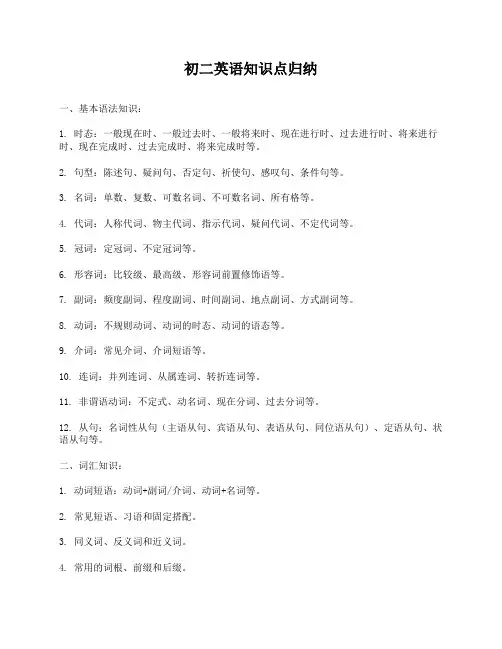
初二英语知识点归纳一、基本语法知识:1. 时态:一般现在时、一般过去时、一般将来时、现在进行时、过去进行时、将来进行时、现在完成时、过去完成时、将来完成时等。
2. 句型:陈述句、疑问句、否定句、祈使句、感叹句、条件句等。
3. 名词:单数、复数、可数名词、不可数名词、所有格等。
4. 代词:人称代词、物主代词、指示代词、疑问代词、不定代词等。
5. 冠词:定冠词、不定冠词等。
6. 形容词:比较级、最高级、形容词前置修饰语等。
7. 副词:频度副词、程度副词、时间副词、地点副词、方式副词等。
8. 动词:不规则动词、动词的时态、动词的语态等。
9. 介词:常见介词、介词短语等。
10. 连词:并列连词、从属连词、转折连词等。
11. 非谓语动词:不定式、动名词、现在分词、过去分词等。
12. 从句:名词性从句(主语从句、宾语从句、表语从句、同位语从句)、定语从句、状语从句等。
二、词汇知识:1. 动词短语:动词+副词/介词、动词+名词等。
2. 常见短语、习语和固定搭配。
3. 同义词、反义词和近义词。
4. 常用的词根、前缀和后缀。
5. 一些常见的词汇拼写规则和变形规则。
6. 数字、日期、星期、时间、颜色、动物、食物、家庭成员、学科、国家和城市等。
三、阅读理解:1. 根据文章内容回答问题。
2. 根据文章中的信息进行推测、判断或总结。
3. 理解文章的主旨、目的、态度、观点等。
4. 根据文章的语境理解词义。
5. 了解不同类型的文体特征和写作方式。
四、写作能力:1. 书面表达:写信、写日记、写作文等。
2. 口头表达:简单介绍、自我介绍、描述事物等。
3. 语法运用:正确使用时态、人称、冠词、代词等。
4. 语言表达:丰富的词汇、恰当的句型、流畅的语言。
五、听力技能:1. 听懂并获取关键信息。
2. 根据对话或短文回答问题。
3. 听懂人物之间的对话和交流。
4. 培养对英语语音和语调的感觉。
六、口语交流:1. 学会问问题和回答问题。
2. 学会用英语进行简单的交流和沟通。
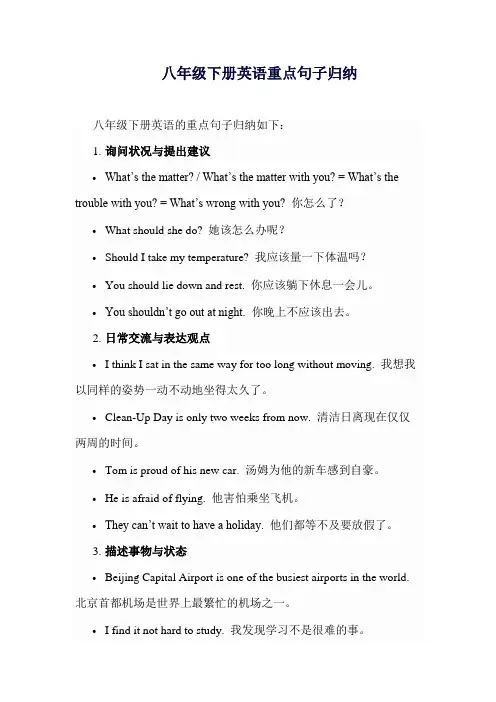
八年级下册英语重点句子归纳八年级下册英语的重点句子归纳如下:1.询问状况与提出建议•What’s the matter? / What’s the matter with you? = What’s the trouble with you? = What’s wrong with you? 你怎么了?•What should she do? 她该怎么办呢?•Should I take my temperature? 我应该量一下体温吗?•You should lie down and rest. 你应该躺下休息一会儿。
•You shouldn’t go out at night. 你晚上不应该出去。
2.日常交流与表达观点•I think I sat in the same way for too long without moving. 我想我以同样的姿势一动不动地坐得太久了。
•Clean-Up Day is only two weeks from now. 清洁日离现在仅仅两周的时间。
•Tom is proud of his new car. 汤姆为他的新车感到自豪。
•He is afraid of flying. 他害怕乘坐飞机。
•They can’t wait to have a holiday. 他们都等不及要放假了。
3.描述事物与状态•Beijing Capital Airport is one of the busiest airports in the world. 北京首都机场是世界上最繁忙的机场之一。
•I find it not hard to study. 我发现学习不是很难的事。
•Mum asks me to go home early after school. 妈妈叫我放学后早点回家。
4.其他常用句型与短语•get married 结婚•since then 从那时起•over the years 多年以来•in some ways 在某种程度上•from time to time 有时•feel lonely 感到孤独•share sth with sb 和某人分享某事•take a bus 坐公交车•go to school 去上学•keep in touch with ... 与……保持联系请注意,这些只是八年级下册英语中的一部分重点句子,实际的教材内容可能还包含更多的重要知识点和句型。
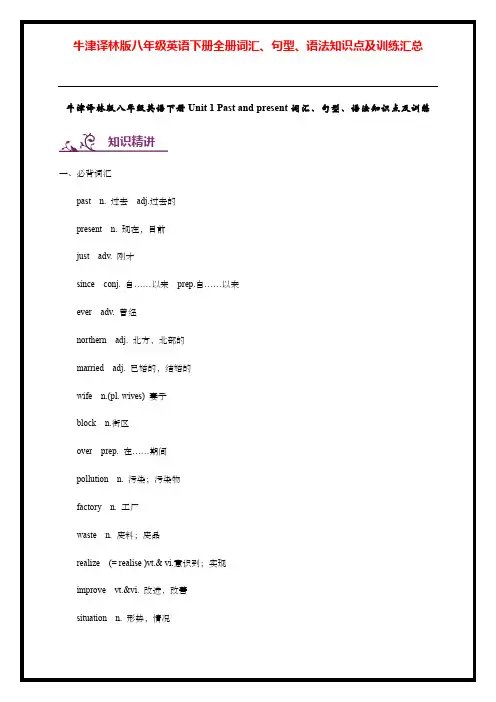
牛津译林版八年级英语下册Unit 1 Past and present词汇、句型、语法知识点及训练知识精讲一、必背词汇past n. 过去adj.过去的present n. 现在,目前just adv. 刚才since conj. 自……以来prep.自……以来ever adv. 曾经northern adj. 北方,北部的married adj. 已婚的,结婚的wife n.(pl. wives) 妻子block n.街区over prep. 在……期间pollution n. 污染;污染物factory n. 工厂waste n. 废料;废品realize (= realise )vt.& vi.意识到;实现improve vt.&vi. 改进,改善situation n. 形势,情况impossible adj. 不可能的before adv.以前,过去lonely adj. 孤独的,寂寞的anyway adv. 尽管,即使这样husband n. 丈夫interview n. 采访;会见yet adv. 还,仍recently adv.近来,最近environment n. 环境transport n.交通车辆,运输工具condition n. 环境,条件,状况return vi. 返回last adv.最近,上一次;最后abroad adv. 到(在)国外primary adj. 小学教育的;初级的communicate vt. &vi. 交流,交际exactly adv.(答语)正是,没错narrow adj. 狭窄的二、重点词汇1. present noun /ˈprez.ənt/1). something that you are given, without asking for it, on a special occasion, especially to showfriendship, or to say thank you(尤指表示友谊或致谢的)礼物,赠品例句:They gave me theatre tickets as a present.他们送给我戏票作为礼物。
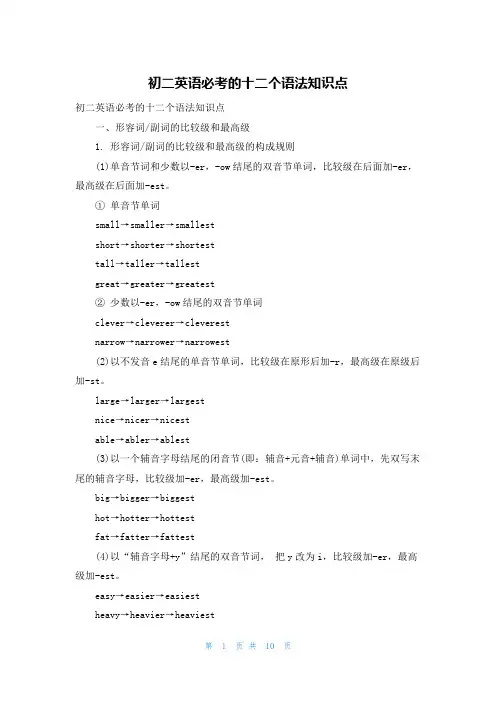
初二英语必考的十二个语法知识点初二英语必考的十二个语法知识点一、形容词/副词的比较级和最高级1. 形容词/副词的比较级和最高级的构成规则(1)单音节词和少数以-er,-ow结尾的双音节单词,比较级在后面加-er,最高级在后面加-est。
① 单音节单词small→smaller→smallestshort→shorter→shortesttall→taller→tallestgreat→greater→greatest② 少数以-er,-ow结尾的双音节单词clever→cleverer→cleverestnarrow→narrower→narrowest(2)以不发音e结尾的单音节单词,比较级在原形后加-r,最高级在原级后加-st。
large→larger→largestnice→nicer→nicestable→abler→ablest(3)以一个辅音字母结尾的闭音节(即:辅音+元音+辅音)单词中,先双写末尾的辅音字母,比较级加-er,最高级加-est。
big→bigger→biggesthot→hotter→hottestfat→fatter→fattest(4)以“辅音字母+y”结尾的双音节词,把y改为i,比较级加-er,最高级加-est。
easy→easier→easiestheavy→heavier→heaviestbusy→busier→busiesthappy→happier→happiest(5)其他双音节词和多音节词,比较级在前面加more,最高级在前面加most。
beautiful→more beautiful→most beautifuldifferent→more different→most differenteasily→more easily→most easily(6)有少数形容词、副词的比较级和最高级是不规则的,必须熟记。
good→better→bestwell→better→bestbad→worse→worstill→worse→worstold→older/elder→oldest/eldestmany/much→more→mostlittle→less→leastfar →further/farther→ furthest/farthest2. 形容词和副词比较级的用法(1)“甲+be+(倍数)+形容词比较级+than+乙”表示“甲比乙…”或“甲比乙…几倍”。
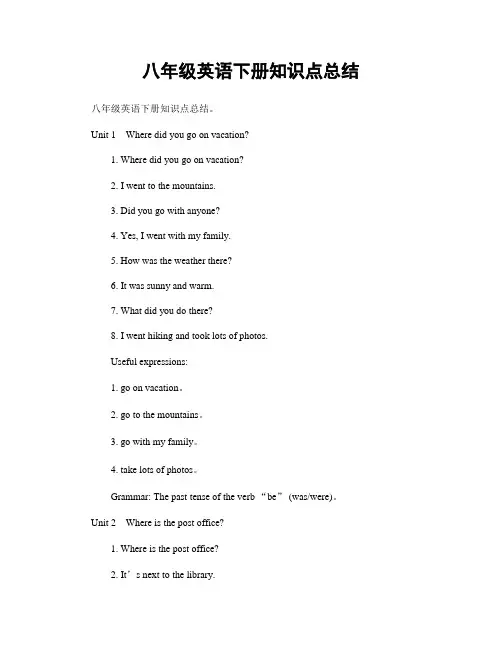
八年级英语下册知识点总结八年级英语下册知识点总结。
Unit 1Where did you go on vacation?1. Where did you go on vacation?2. I went to the mountains.3. Did you go with anyone?4. Yes, I went with my family.5. How was the weather there?6. It was sunny and warm.7. What did you do there?8. I went hiking and took lots of photos.Useful expressions:1. go on vacation。
2. go to the mountains。
3. go with my family。
4. take lots of photos。
Grammar: The past tense of the verb “be” (was/were)。
Unit 2Where is the post office?1. Where is the post office?2. It’s next to the library.3. How do I get to the bookstore?4. Go straight and turn left at the first corner.5. Is there a supermarket near here?6. Yes, there is. It’s across from the park.7. How far is it from here?8. It’s about 10 minutes’ walk.Useful expressions:1. next to。
2. across from。
3. turn left/right。
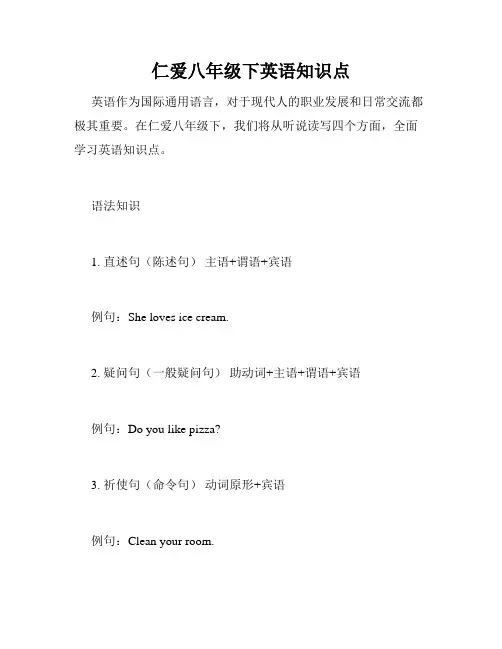
仁爱八年级下英语知识点英语作为国际通用语言,对于现代人的职业发展和日常交流都极其重要。
在仁爱八年级下,我们将从听说读写四个方面,全面学习英语知识点。
语法知识1. 直述句(陈述句)主语+谓语+宾语例句:She loves ice cream.2. 疑问句(一般疑问句)助动词+主语+谓语+宾语例句:Do you like pizza?3. 祈使句(命令句)动词原形+宾语例句:Clean your room.4. 句子成分(主语、谓语、宾语、定语、状语等)例句:The boy with glasses is my friend.口语表达1. 自我介绍例句:Hello, my name is Jack. I am from Shanghai.2. 意见交流例句:What do you think of this movie?3. 问路例句:Excuse me, where is the nearest bank?4. 约会例句:Would you like to have dinner with me tonight?听力训练1. 美国口音和英国口音的区别2. 不同场景下的英语口语表达3. 对话中正确听取数字、时间等4. 听取简单的新闻或者广播等阅读理解1. 阅读基础知识(字母、数字、大小写)2. 阅读简单的短文,了解文章基本内容3. 阅读故事和小说,理解情节和人物关系4. 阅读新闻等实用文章,了解时事信息写作能力1. 自我介绍2. 写日记、周记、月记等3. 写作文,例如:写一篇关于影响健康的因素的文章4. 写简历,求职信等总结仁爱八年级下英语知识点包含了很多方面,包括语法、口语、听力、阅读和写作等,我们需要在日常学习中逐步积累和运用这些知识点。
只有通过反复的练习和实践,我们才能真正掌握英语知识,使其成为我们通往更广阔世界的一把钥匙。
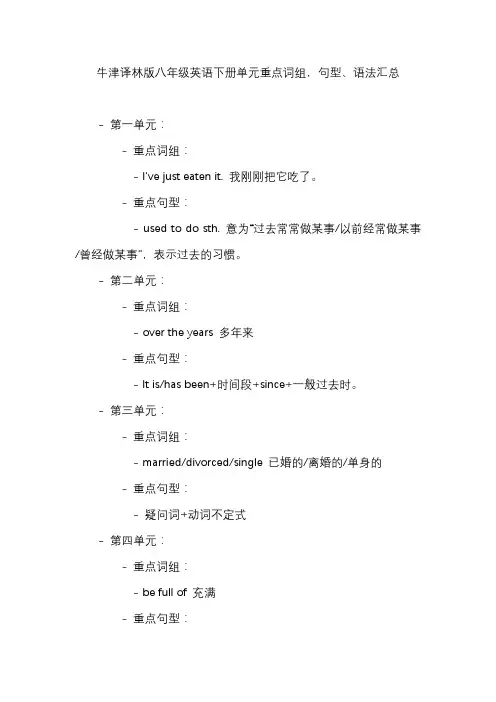
牛津译林版八年级英语下册单元重点词组,句型、语法汇总
- 第一单元:
- 重点词组:
- I've just eaten it. 我刚刚把它吃了。
- 重点句型:
- used to do sth. 意为“过去常常做某事/以前经常做某事/曾经做某事”,表示过去的习惯。
- 第二单元:
- 重点词组:
- over the years 多年来
- 重点句型:
- It is/has been+时间段+since+一般过去时。
- 第三单元:
- 重点词组:
- married/divorced/single 已婚的/离婚的/单身的
- 重点句型:
- 疑问词+动词不定式
- 第四单元:
- 重点词组:
- be full of 充满
- 重点句型:
- so that 以便,为了
- 第五单元:
- 重点词组:
- as a result 结果
- 重点句型:
- 现在完成时
- 第六单元:
- 重点词组:
- interview sb. about sth. 就某事采访某人- 重点句型:
- It is+形容词+to do sth.
- 第七单元:
- 重点词组:
- return to sp. 回到某地
- 重点句型:
- 现在完成时
- 第八单元:
- 重点词组:
- primary school 小学
- 重点句型:
- 祈使句。
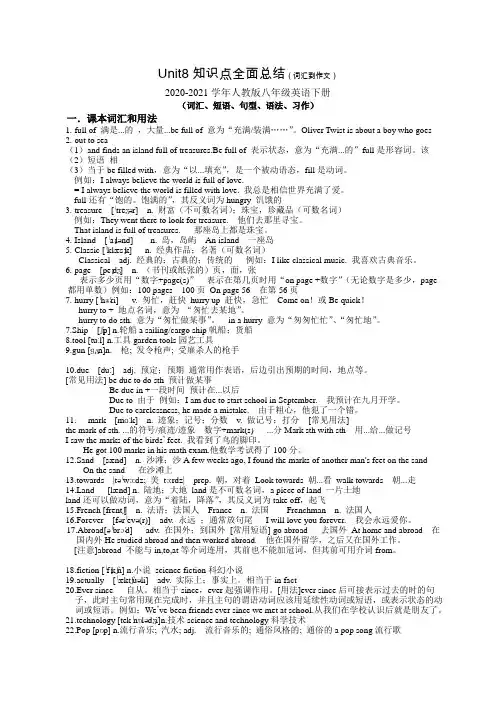
Unit8知识点全面总结(词汇到作文)2020-2021学年人教版八年级英语下册(词汇、短语、句型、语法、习作)一.课本词汇和用法1.full of 满是...的,大量...be full of 意为“充满/装满……”。
Oliver Twist is about a boy who goes2.out to sea(1)and finds an island full of treasures.Be full of 表示状态,意为“充满...的”full是形容词。
该(2)短语相(3)当于be filled with,意为“以...填充”,是一个被动语态,fill是动词。
例如:I always believe the world is full of love.= I always believe the world is filled with love. 我总是相信世界充满了爱。
full还有“饱的。
饱满的”,其反义词为hungry 饥饿的3.treasure [ˈtreʒər] n. 财富(不可数名词);珠宝,珍藏品(可数名词)例如:They went there to look for treasure. 他们去那里寻宝。
That island is full of treasures. 那座岛上都是珠宝。
4.Island [ˈaɪlənd] n. 岛,岛屿An island 一座岛5.Classic [ˈklæsɪk] n. 经典作品;名著(可数名词)Classical adj. 经典的;古典的;传统的例如:I like classical music. 我喜欢古典音乐。
6.page [peɪdʒ] n. (书刊或纸张的)页,面,张表示多少页用“数字+page(s)”表示在第几页时用“on page +数字”(无论数字是多少,page 都用单数)例如:100 pages 100页On page 56 在第56页7.hurry [ˈhɜːri] v. 匆忙,赶快hurry up 赶快,急忙Come on!或Be quick!hurry to + 地点名词,意为“匆忙去某地”。
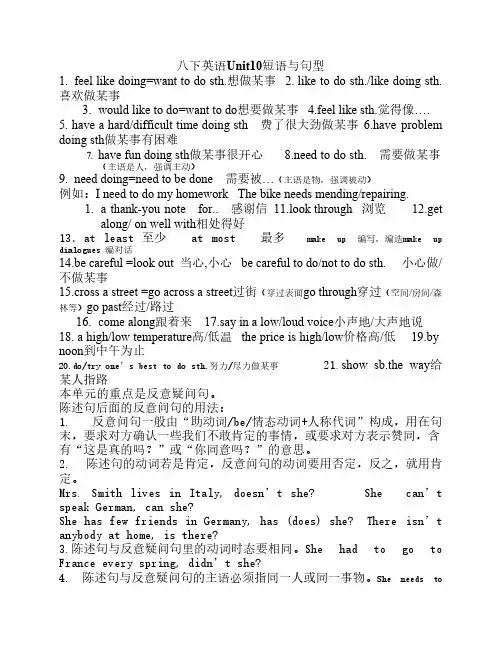
八下英语Unit10短语与句型1. feel like doing=want to do sth.想做某事2. like to do sth./like doing sth.喜欢做某事3. would like to do=want to do想要做某事4.feel like sth.觉得像….5. have a hard/difficult time doing sth 费了很大劲做某事6.have problem doing sth做某事有困难7. have fun doing sth做某事很开心 8.need to do sth. 需要做某事(主语是人,强调主动)9. need doing=need to be done 需要被…(主语是物,强调被动)例如:I need to do my homework The bike needs mending/repairing.1. a thank-you note for.. 感谢信 11.look through 浏览12.getalong/ on well with相处得好13.at least 至少 at most 最多 make up 编写,编造make up dialogues 编对话14.be careful =look out 当心,小心 be careful to do/not to do sth. 小心做/不做某事15.cross a street =go across a street过街(穿过表面go through穿过(空间/房间/森林等)go past经过/路过16. come along跟着来 17.say in a low/loud voice小声地/大声地说18. a high/low temperature高/低温 the price is high/low价格高/低 19.by noon到中午为止20.do/try one’s best to do sth.努力/尽力做某事 21.show sb.the way给某人指路本单元的重点是反意疑问句。
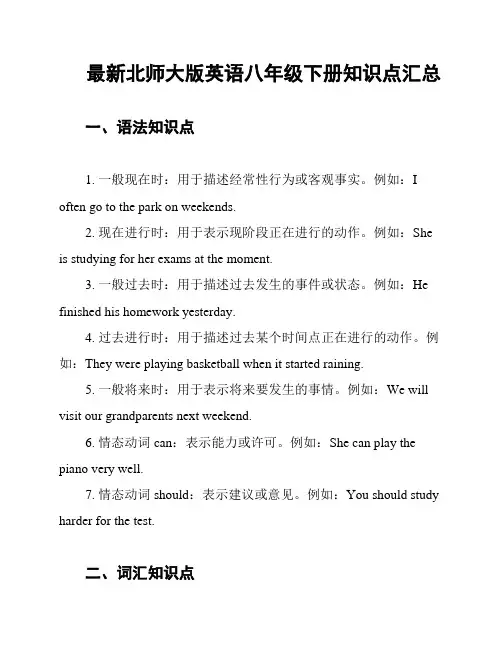
最新北师大版英语八年级下册知识点汇总一、语法知识点1. 一般现在时:用于描述经常性行为或客观事实。
例如:I often go to the park on weekends.2. 现在进行时:用于表示现阶段正在进行的动作。
例如:She is studying for her exams at the moment.3. 一般过去时:用于描述过去发生的事件或状态。
例如:He finished his homework yesterday.4. 过去进行时:用于描述过去某个时间点正在进行的动作。
例如:They were playing basketball when it started raining.5. 一般将来时:用于表示将来要发生的事情。
例如:We will visit our grandparents next weekend.6. 情态动词 can:表示能力或许可。
例如:She can play the piano very well.7. 情态动词 should:表示建议或意见。
例如:You should study harder for the test.二、词汇知识点1. 动物类词汇:例如cat(猫)、dog(狗)、elephant(大象)、tiger(老虎)等。
2. 学科类词汇:例如mathematics(数学)、science(科学)、history(历史)、English(英语)等。
3. 蔬菜类词汇:例如carrot(胡萝卜)、tomato(西红柿)、cabbage(卷心菜)、potato(土豆)等。
4. 家庭类词汇:例如father(父亲)、mother(母亲)、brother(兄弟)、sister(姐妹)等。
5. 地点类词汇:例如park(公园)、school(学校)、hospital (医院)、restaurant(餐厅)等。
三、阅读技巧1. 浏览标题和副标题,了解文章的大致内容。
仁爱版初二下册英语知识点(经典版)编制人:__________________审核人:__________________审批人:__________________编制单位:__________________编制时间:____年____月____日序言下载提示:该文档是本店铺精心编制而成的,希望大家下载后,能够帮助大家解决实际问题。
文档下载后可定制修改,请根据实际需要进行调整和使用,谢谢!并且,本店铺为大家提供各种类型的经典范文,如演讲稿、总结报告、合同协议、方案大全、工作计划、学习计划、条据书信、致辞讲话、教学资料、作文大全、其他范文等等,想了解不同范文格式和写法,敬请关注!Download tips: This document is carefully compiled by this editor. I hope that after you download it, it can help you solve practical problems. The document can be customized and modified after downloading, please adjust and use it according to actual needs, thank you!In addition, this shop provides you with various types of classic sample essays, such as speech drafts, summary reports, contract agreements, project plans, work plans, study plans, letter letters, speeches, teaching materials, essays, other sample essays, etc. Want to know the format and writing of different sample essays, so stay tuned!仁爱版初二下册英语知识点《仁爱版英语》针对中国大陆七至九年级学生的英语学习现状而专门为中国大陆七至九年级学生设计、编写的英语教材。
人教版八年级下册英语:Unit10重点短语、重点句型、交际用语、语法、书面表达范文汇编Unit 10 I’ve had this bike for three years.一、重点短语Section A1a-1c1.for three years 三年2.how long 多久,多长3.over there 在那边4.ride a bike 骑自行车5.have a yard sale 举办庭院出售/庭院拍卖会6.yard sale 庭院拍卖会,旧货出售7.more than=over超过,多余8.十多年for more than 10 years9.sweet memory (memories)甜美/美好的回忆10.sweet potato红薯11.bring back sweet memories带回甜美/美好的回忆,勾起甜美的回忆,12.give away old things to sb.把旧的东西送人13.in need需要14.for seven years 有七年15.three times三次,三遍,三倍16.how much 多少钱,多少+不可数名词Section B 2a-2d17.toy bear 玩具熊18.toy lion 玩具狮子19.toy tiger 玩具老虎20.bread maker 面包机21.g ive away 赠送22.not.. anymore=no more 不再…23.not ...any longer=no longer不再24.soft toys 步绒玩具,软体玩具,毛绒玩具25.keep the bear保留玩具熊26.welcome to sp. 欢迎到某地27.the Sunshine Home for Children 阳光儿童之家28.have something for the kids/children有东西送给孩子们29.for a couple of months 有几个月30.a couple of两个,几个,一对31.a bit =a little =a little bit =kind of 有点32.check out 察看,观察,看看33.board games 棋类游戏34.one last thing 最后一件东西35.for a long time 有很长一段时间36.Thanks so much!= Thanks a lot!= Thank you very much!非常感谢,多谢! Section A 3a-3c37.长大grow up38.in junior high school 在上中学/初中39.in a yard sale 在庭院售卖会/旧货出售活动中40.give the money to 把钱捐给......41.a children’s home 儿童之家,孤儿院42.clear out 清理,清理出来,丢掉43.a lot of =many =lots of =a number of 许多,大量44.at first =first of all= to begin with一开始,首先45.许多东西a lot of things46.play with玩耍47.for example/instance 例如48.own a train and railway set 拥有一套火车和铁路轨道的玩具49.every week 每个星期50.toy monkey 玩具猴51.next to 在......旁边52.在猴子旁边next to the monkey53.睡在猴子旁边sleep next to the monkey54.55.every night 每天晚上56.part with放弃,交出,和......分开57.as for me 对我来说,至于我58.as for至于,关于59.give up 放弃60.football shirts足球服,橄榄球衣61.to be honest 说实在的62.for a while 有一段时间63.with the money 用钱64.考虑,思考,认为,想过think about65.even though =even if = although =though 虽然,尽管,即使Section A Grammar Focus-4c66.踢足球play football=play soccer ball67.in Japan 在日本68.three days ago三天前69.有三天for three days70.ten hours ago 十小时以前71.for ten hours有十个小时72.have a camera有一个摄影机/摄像机73.three years ago三年前74.on Monday在星期一75.生病become ill76.water park水上乐园,水上公园77.next month 下个月78.have a dog=keep a dog 饲养狗,养狗79.有一架钢琴have a piano80.from the Li family从/跟李家(买的81.move to the US 搬到美国st year 去年83.be back to =come back to =get back to回到,回来84.f or two years 有两年85.a lot =very much 非常,很,常常86.for over 20 years 20多年87.in this small town 在这个小城里,在这个小镇里Section B 1a-1d88.high school 高中,中学,高级中学89.middle school中学,初级中学90.primary school小学91.live in 居住92.在周末on weekends= on the weekend93.镇图书馆town library94.科学博物馆science museum95.沿街饭店restaurant down the street96.a concert hall音乐厅,歌厅97.for at least 20 years 至少有20年Section B 2a-2d98.(be the same as和......一样)99.(in the passage 在这篇短文里/文章中)lions of 许多,上百万,数百万101.leave the countryside 离开农村/乡村102.每年every year103.how often 多久一次104.hometown feeling家乡情怀105.once or twice a year=one or two times a year一年一到两次106.search for work 找工作107.寻找look for=search for108.in the cities 在城市里,到城市里109.for the last 13 years=for the past three years 在过去的13年里110.with a hard job工作非常辛苦111.in a crayon factory在蜡笔厂112.much time 许多时间113.return home =get back home=come back home=be back home 回家114.at least 至少115.once a year 一年一次116.for almost three years 几乎有三年117.regard with great interest=become interested in=be interested in =take aninterest in 对......感兴趣,以浓厚的兴趣关注着rge hospitals大医院119.build new school建盖新学校120.send teachers from从......派老师来121.......真实的一面be true of122.learn to read and count学会阅读和数数123.20世纪中期the mid-20th century124.always stay the same一成不变,保持老样子125.according to依据;按照126.opposite the school=across from the school学校对面127.become quite a symbol of the place 成为这个地方的象征/标志128.most of the children大多数孩子们129.一起玩play together130.under that big tree 在那棵大树下面131.during the summer holidays在暑假期间132.such a happy childhood多么快乐的童年133.leave many soft and sweet memories 留下许多温柔甜美的回忆134.in one’s heart在某人心目中,在某人心中135.t hese days=now =at present= at the moment 目前;现在136.回到return to137.in close to three years 在近三年在138.几乎,接近close to139.拥有/承载着所有儿时的记忆hold all sb.’s childhoodSection B 3a-Self Check140.把某物给某人give sth. to sb.141.如此,这么,那么,非常so much142.在第一段in the first paragraph143.在第二段in the second paragraph144.对某人很特别/特殊be special to sb.145.在第三段in the third paragraph146.玩电子游戏play computer games147.so far=up to now 迄今;到现在为止,目前为止148.in Beijing在北京149.for about two years 大约有两年150.回到美国be back to the US/the America/the United States/the U.S.A 151.move to China 搬到中国152.去那里go there153.10 years old 十岁154.把……看做regard…as…二、重点句型及知识点Section A 1. I learned how to ride a bike on it.我学会了怎样骑自行车。
八年级下册仁爱版英语知识点
以下是八年级下册仁爱版英语的部分知识点:
1. 动词不定式:在英语中,动词不定式是一种形式,它由“to + 动词原形”构成,可以作为名词、形容词、副词或介词使用。
2. 过去进行时:表示在过去某个时刻正在进行的动作或正在进行的动作。
3. 现在完成时:表示某个动作已经完成,但对现在仍有影响。
4. 条件状语从句:表示某个条件下的结果或假设。
5. 宾语从句:表示某个宾语是一个完整的句子。
6. 被动语态:表示某个动作被执行,而不是由主语主动执行。
7. 情态动词:表示某个动作的可能性、必要性或意愿。
8. 介词短语:表示某个动作的位置、时间或方向。
9. 连词短语:表示两个或多个句子之间的关系。
10. 形容词的比较级和最高级:表示某个形容词的程度或比较关系。
以上知识点仅供参考,如需更多内容,建议查看仁爱版八年级下册英语教科书或请教专业英语教师。
8下英语第一单元英语知识点
以下是八下英语第一单元的一些重要知识点:
1. 情态动词can的用法:表示能力,意为“能、会”。
后接动词原形,没
有人称和数的变化。
2. 动词短语be able to do sth.的用法:表示经过努力,克服困难后完成某事,后接动词原形。
3. 介词in的用法:表示在某个范围或方面,后接名词或动名词。
4. 形容词good的用法:表示“好的”,常用于描述事物的性质或特点。
5. 形容词的比较级形式:表示比较关系,常用than连接比较对象。
6. 副词well的用法:表示“好地”,修饰动词、形容词或副词。
7. 常用短语be free to do sth.的用法:表示自由地做某事,后接动词原形。
8. 动词短语have a chance to do sth.的用法:表示有机会做某事,后接动词原形。
9. 动词短语get a chance to do sth.的用法:表示得到机会做某事,后接
动词原形。
10. 情态动词should的用法:表示建议或推荐,后接动词原形,没有人称
和数的变化。
以上是八下英语第一单元的一些重要知识点,通过熟练掌握这些知识点,有助于提高英语语言能力。
初二(八年级)下册英语第一单元知识点归纳初二(八年级)下册英语第一单元知识点主要是依据初二(八年级)下册英语教材,从重点短语、知识归纳、语法知识这三个部分总结了初二(八年级)下册英语第一单元知识点,适合初二学生学习英语、中考考生备考英语。
【重点短语】1. fewer people 更少的人(fewer修饰名词复数,表示否定)2. less free time 更少的空闲时间(less修饰不可数名词,表示否定)3. in ten years 10年后(in的时间短语用于将来时,提问用How soon)4. fall in love with…爱上…例:When I met Mr. Xu for the first time, I fell in love with him at once当我第一次见到许老师,我立刻爱上他5. live alone 单独居住6. feel lonely 感到孤独(比较:live alone/go along等)The girl walked alone along the street, but she didn’t feel lonely那女孩独自沿着街道走,但她并不感到孤独7. keep/feed a pet pig 养一头宠物猪8. fly to the moon 飞上月球9. hundreds of +复数数百/几百(概数,类似还有thousands of; millions of)10. the same as 和……相同11. A be different from B A与B不同(=There is a difference/Thgere are differences between A and B)12. wake up 醒来(wake sb. up表示“唤醒某人”13. get bored 变得厌倦(get/become是连系动词,后跟形容词如tired/angry/excited等)14. go skating 去滑冰(类似还有go hiking/fishing /skating/bike riding等)15. lots of/a lot of 许多(修饰可数名词、不可数名词都可以)16. at the weekends 在周末17. study at home on computers 在家通过电脑学习18. agree with sb. 同意某人(的意见)19. I don’t agree. = I disagree. 我不同意20. on a piece of paper 在一张纸上(注意paper/information/news/work/homework/housework等常考到的不可数名词)21. on vacation 度假22. help sb with sth/help sb do sth 帮助某人做某事23. many different kinds of goldfish 许多不同种金鱼24. live in an apartment 住在公寓里/live on the twelfth floor 住在12楼25. live at NO.332,Shanghai Street 住在上海路332号26. as a reporter 作为一名记者27. look smart 显得精神/看起来聪明28. Are you kidding? 你在骗我吗29. in the future 在将来/在未来30. no more=not …anymore 不再(强调多次发生的动作不再发生)I’ll go there no more.31. no longer=not… any longer 不再(强调状态不再发生)32. besides(除…之外还,包括)与except …but(除…之外,不包括)33. be able to与can 能、会l (be able to用于各种时态,而can只能用于一般现在时态和一般过去时态中;have to用于各种时态,而must只能用于一般现在时态)例如:1.I have been able to/will be able to speak two languages. (不可以用can)2. had to stay at home/ will have to (不可以用must)34.be big and crowded 大而且拥挤34. be in college 在上大学35. live on a space station 住在空间站36. dress casually 穿得很随意casual clothing 休闲服饰37. win the next World Cup 赢得世界杯 win award 获僵38. come true 变成现实39. take hundreds of years 花几百年的时间40. be fun to watch 看起来有趣41. over and over again 一次又一次42. be in different shapes 形状不同43. twenty years from now 今后20年【本单元目标句型】1. What do you think life will be like in 1000 years?2. There will be fewer trees、more buildings and less pollution in the future.l fewer; less表示否定之意,分别修饰可数名词和不可数名词;more二者都可以修饰。
整理文本Unit2单元短语句型归纳【短语】1. Clea n-Up Day 清洁日2. an old people ' 养h 老mfe3. help out with sth.帮助解决困难4. used to 曾经 .. ;过去常常做某事5. care for 关心; 照顾care about 担心; 关心 7. at the age of 在..…岁时 8.clean up 打扫(或清除)干净9. cheer up 使)变得更高兴; 10. give out 分发;散发11. come up with 想出;提出12. make a pla 制 订计划13. make some notices 做 些公告牌30. after-school readi ng progra 课外阅读项目31. the look of joy 快乐的表情14. try out 试用;试行 16. put up 建造;举起;张贴18. call up 打电话;召集20. for example 比如;例如22. take after 与.....相像;像23. give away 赠送;捐赠 25. be similar to 与.. 相似 26. set up 建立;设立28. make a differe nee 影响;有作用 15. work for 为 ... 工作;为 ... 效力 17. ha nd out 分发;散发;发给 19. put off 推迟;延迟 21. raise money 筹钱;募捐 24. fix up 修理;修补;解决 be familiar with 于 ... 熟悉 27. disabled people 残 疾人 29. be able to 能够【典句必背】整理文本1. The boy could give out food at the food bank这个男孩可以在食品救济站分发食物。
初二下学期英语知识点句型Unit 1 What’s the matter?
一、重点短语
1. have a fever 发烧
2. have a cough 咳嗽
3. have a toothache 牙疼
4. talk too much 说得太多
5. drink enough water 喝充足的水
6. have a cold 受凉;感冒
7. have a stomachache 胃疼
8. have a sore back 背疼
9. have a sore throat 喉咙痛
10. lie down and rest 躺下来休息
11. hot tea w ith honey 加蜂蜜的热茶
12. see a dentist 看牙医
13. get an X-ray 拍X 光片
14. take one’ s temperature 量体温
15. put some medicine on sth. 在……上面敷药
16. feel very hot 感到很热
17. sound like 听起来像
18. all weekend 整个周末
19. in the same way 以同样的方式
20. go to a doctor 看医生
21. go along 沿着……走
22. on the side of the road 在马路边
23. shout for help 大声呼救
24. without th inking twice 没有多想
25. get off 下车
26. have a heart problem 有心脏病
27. to one’ s surprise 使....... [京讶的
28. thanks to 多亏了;因为
29. in time 即时
30. save a life 挽救生命
31. get into trouble 造成麻烦
32. right away 立刻;马上
33. because of 因为
34. get out of 离开;从……出萍
35. hurt oneself 受伤
36. put a bandage on sth. 用绷带包扎
37. fa ll down 摔倒
38. feel sick 感到恶心
39. have a nosebleed 流鼻血
40. cut his knee 割伤他的膝盖
41. put her head back 把她的头向后仰
42. have problems breathing 呼吸困难
43. mountain climbing 登山运动
44. be used to doing sth. 习惯做某事
45. run out (of) 用完;用尽
46. so that 以便
47. so. . . that 如此… …以至于…
48. be in control of 掌管;管理
49. in a d iffic u lt situation 在闲境屮
50. keep on doing sth. 继续或坚持做某事
51. make a decision 做出决定
52. take risks 冒险
53. give up 放弃
二、重点句型
1. What’ s the matter?
What’ s the matter with you?
= What’s the trouble with you?
= What’ s wrong with you?
你怎么了?。